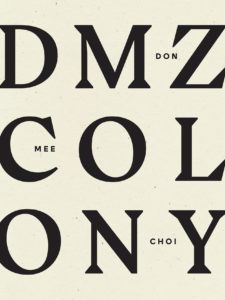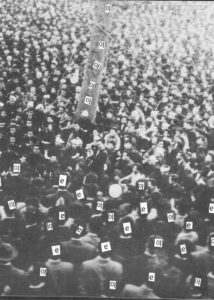by Woogee Bae | Contributing Writer

This essay is part of a series in which Poetry Northwest partners with Seattle Arts & Lectures to present reflections on visiting writers from the SAL Poetry Series. On Thursday, April 7, Don Mee Choi will read and discuss her work at the Hugo House at 7:30 pm Pacific time. Tickets to this in-person and online event can be purchased at the SAL website.
—
I am preoccupied with difficulty. What does it mean to trouble, displease, question complicity? How hard is it to perform labor, live with our bodies, heal trauma, write poems, this essay? In my preoccupation, I acknowledge language’s limitations, my own linguistic failures. Perhaps “difficulty” is too soft a word to capture the world as it is: horrific, cruel, unjust, imperial. But I begin with it for several reasons.
The difficulty of addressing and articulating the daily atrocity of war, the conditions that enable wealth disparity, redlining, police brutality, incarceration, displacement of peoples abroad and locally—is there language for it? What does it mean to seek reason for it?
The difficulty for poetry to honestly and caringly hold the vastness of my—and perhaps your—love for people, the land, this life. Dreams for an otherwise, we try.
And here, the difficulty of writing about a poet whose work I not only admire, but who, for me and many others, expands the possibilities of language, eradicates the boundaries of legibility, allows me to question who gets to be read and by whom? Who do we attempt to understand?
In the face of atrocity, I wonder what we can learn from difficulty. I wonder how it can reveal history’s erasures that create present injustices, move us toward an elsewhere, or an offering of it.
I was introduced to Don Mee Choi’s work shortly after my introduction to poetry. I was 19, studying creative writing under another Korean American poet, Myung Mi Kim. By happenstance, I lived in Buffalo, New York; attended the state university where Kim taught, because I lacked funds to move elsewhere; and amidst the shame of language, of poverty, of otherness, learned about a poet who actively disobeyed.
A poet-translator, Choi translated numerous works by Korean poets, most notably Kim Hyesoon, and authored three collections of poetry: The Morning News is Exciting, Hardly War, and DMZ Colony, the latter of which won the 2020 National Book Award for Poetry. In her acceptance speech, Choi said, “It is more important than ever that we engage in the non-predatory, idle labor of poetry and translation and be on the side of the struggles of those who sat upon here and abroad.”
I’m continuously astounded by Choi as a poet and human who refuses to shy away from exposing empire in the same breath that she holds the stories of orphans, political protestors, and the dead with care. Amidst the critique of imperialism and militarism—and their devastation and pollution on land, on lives, on language—Choi brings to surface the voices of those deemed collateral, or barriers, in a nation’s fight for sovereignty: the photographers (her father) who document history, citizens who disrupt government orders, and unnamed children who search for home and family.—
In Hardly War, she writes:
What I am attempting to do with my poems and my father’s photographs is what I used to do as a child when I stared at my father’s photographs and maps. I’m trying to imagine race=nation, its language, its wars. I am trying to fold race into geopolitics and geopolitics into poetry. Hence, geopolitical poetics. It involves disobeying history, severing its ties to power.
With DMZ Colony, she begins:
The Korean Demilitarized Zone is approximately 160 miles long and 2.5 miles wide. The DMZ runs across the 38th parallel, a division created after World War II, with the end of the 35-year-long Japanese occupation of Korea. The US occupied the south, and the Soviet Union the north. The US still occupies South Korea with military installations, bases, and troops. The Korean border is one of the most militarized borders in the world.
Choi’s words point us toward a world beyond the American imagination. A world in a perpetual state of war—or at the brink of it—that I, or you, are detached from and entangled with. Who are the people forced to leave their homelands? Who are the people with wings, flapping incessantly in foreign countries, unwelcomed and unable to land? Had we been taught to look for them? Was it our/your country that forced these flights?
Choi understands that a poetics that severs its ties to power is also aware of the intimacy of militarization abroad with the racism and violence on American soil. War displaces people, continues the long lineage of American and European occupation on countries like South Korea, Guam, the Philippines. To put it plainly, the U.S. has their hands in global policy, embracing the cycles of refuge, escape, longing to benefit economic, militaristic, and political needs—a necessary part to fuel our exceptionalism and international compliance. This is a truth we must be enraged about.
In her translated interview with Ahn Hak-sop, a North Korean sympathizer and political prisoner of the U.S. and South Korea after the war’s pause in 1953, he says:
. . . like I said I despised America . . . I really thought America liberated us . . . in Incheon when people came out to welcome the Americans they were shot indiscriminately . . . the American troops were not liberators but occupiers . . .
Disobedience appears frequently in Choi’s work, as does the revelation that language—in her case, English and Korean—is not and can never be equal. An occupied country cannot be on equal standing with the occupier. But an occupied country can also be the occupier elsewhere, can terrorize their own. Knowing this, poetry and translation are crucial to move us in defying linguistic orders: to “failfail” in our mastery of language, as displaced and terrorized people adapt new tongues, as they “twirl about frantically frequently” so as to feign English, as Choi describes in her essay, “Freely Frayed.”
Elsewhere, in her essay, “ᄏ=q”, Choi writes:
My translation intent has nothing to do with personal growth, intellectual exercise, or cultural exchange, which implies an equal standing of some sort. South Korea and the U.S. are not equal. I am not transnationally equal. My intent is to expose what a neocolony is, what it does to its own, what it eats and shits.
When someone or something is not transnationally equal, can a translation—and language, for that matter—adequately capture the grief, the terror, the hope of protest and resilience of a people? There are some things that words alone cannot articulate, experiences beyond some of our imaginations. Safely, some people write and read and eat and shit, living without the odds of a similar cruelty.
Through Ahn, we arrive at another example of disobedience. He recounts his participation in the movement against the U.S. military’s occupation of Korea, his time in prison, the beatings he endured, the malnourishment, his refusal to change his political views. But both Choi and Ahn leave it up to us—the readers and receivers of Ahn’s memory—to imagine that which cannot be uttered, if it can be imagined at all.
In Ahn’s words: “. . . I won’t say what they did to me . . . I’ll leave it up to your imagination.”
Choi adds: “I’ll leave it up to your imagination what a DMZ village looks like, what his house looks like, what his dogs look like, how many of his teeth are missing . . .”
She never fully describes the space that Ahn inhabits, the pervasiveness of barbed wire, the imprints on Ahn’s body from countless torture. The gaps in memory are indicated within ellipses—or are they intentional omissions? Both Choi and Ahn refuse to be compliant, to satisfy the nation or readers. And what satisfaction would come of it?
In one of the last sections in DMZ Colony, “Mirror Words,” Choi starts with an epigraph by Gilles Deleuze that reads: “Language is made not to be believed but to be obeyed, and to compel obedience.”
As such, our attentiveness to language—including its fractures and failures—is vital, though not singular, in our untethering to power. If part of language as we know it seeks to uphold things as they are, then Choi proposes an alternative to the orderly trails it leaves. Mirror words break grammar rules and unsettle the norm. They reveal structures in place made to control, that force discipline, that drives one to appease. They thrust us into a space of discomfort, our bodies and tongues thrashing and lashing to catch hold of the familiar. Mirror words call on us to move in all directions, to misbehave:
Ruoy Ycnellecxe,
Si ti Laitram Wal?
Laturb Eripme!
Ruoy slagelli, Ruoy seegufer, Ruoy laretalloc egamad of eht dlrow
Etinu tsniaga Ruoy raer.
Ew era evila.
It is this section of the book that stuns me most, in its illegibility as well as its imagining of another, other relationship with language. Translating out of imposed orders, beyond borders, and into a space of resistance. Translation as flight, migration out of here, toward wherever we go next. “Translation as an anti-neocolonial mode can create other words,” Choi writes. “I call mine mirror words.”
Or, from “ᄏ=q,” “I speak rubbish and you hear it as English. I scribble like a foreigner. I have become a foreigner. That is what I am in English.”
I’m drawn to Choi’s pursuit of speaking rubbish, of mirroring words, perhaps because of my own language loss over the years. How English took hold of my speech, how I suppressed and dislodged most of the Korean I knew. With my loss came the supposed gift of citizenship, the joys and dreams attached to it, the containers and near evictions that followed.
I grieve this loss regularly. I grieve the impossible weight of empire, the shame it builds, its continual loom over me, my ancestors. How does one find again their language? What else might there be in its place? After all, what we know is not all there is.
“Mirror words are meant to compel disobedience, resistance. Mirror words defy neocolonial borders, blockades. Mirror words flutter along borders and are often in flight across oceans, even galaxies. Mirror words are homesick. Mirror words are halo. Mirror words are orphaned words. Now look at your words in a mirror. Translate, translate! Did you? Do it again, do it!”
Rubbish, scribbles, mirrored words—all warped and worthless, unreadable, unreachable. These are the words I feel compelled to turn to. The words you don’t understand. The words you find difficult.
Lliw uoy tsiser? Lliw uoy rorrim sdrow? Lliw uoy?
—
Woogee Bae writes poems and edits at Snail Trail Press. She received her MFA from the University of Washington Bothell’s Creative Writing and Poetics Program. Writings can be found in P-QUEUE, Poetry Northwest, Tagvverk, and elsewhere.



